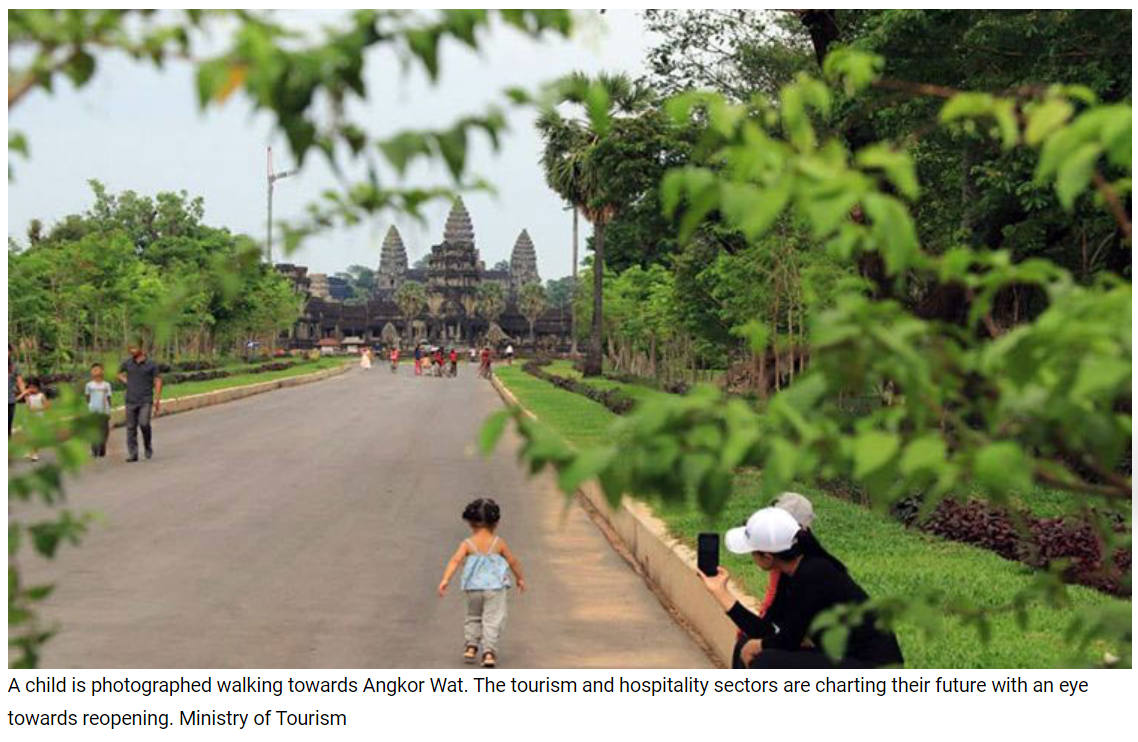Cambodian tourism sector envisages new normal
Nearly two months after the World Health Organization declared Coronavirus to be a “global health emergency” last year, the government announced that it would clamp down on tourist visas. Now, the tourism and hospitality sectors are charting their future with an eye towards reopening.
The Kingdom’s hotel and restaurant sector retracted by 36 percent last year, according to official figures.
Heads of the restaurant, tourism and travel associations are refusing to throw in the towel. Instead, they are reflecting on what worked for them during the pandemic and are looking forward to an eagerly anticipated recovery that will bring innovation and creativity to the forefront.
The sentiment among associations is that Cambodia will likely open up by the end of the year, in part because of strong vaccination efforts and the fact that Phnom Penh.
particularly is among the most vaccinated capitals in the world.
Ronni Dofl of the Cambodia Domestic Management Co (CDMC) told Khmer Times there is a high likelihood that the Kingdom will probably re-open to international tourists before neighbouring Thailand and Vietnam as a result.
CDMC is a part of a collective consisting of 17 travel agencies. Dofl told Khmer Times he anticipates a “rebranding” of Cambodia to international visitors with future guests booking longer stay vacations in Cambodia rather than making the Kingdom a part of a larger Southeast Asian circuit.
“People will travel slower, stay longer and move around less,” Dofl said. “They don’t want to go through as many airports. This is a unique opportunity for Cambodia. We no longer want to be the ‘Angkor Wat stopover’ after Thailand or Vietnam. There is a big chance that Cambodia will open up before Vietnam so this is a great opportunity to promote Cambodia as a standalone destination. Right now, I think the biggest demand is coming from the United Kingdom but the countries with the most lenient travel restrictions will be the ones that will be most interesting to look at.”
Members of all associations said there had been a “talent drain” in the travel and leisure industries – many highly skilled veterans of the tourism and hospitality sectors have resorted to selling insurance or farming, they said.
“The pandemic has been devastating for both owners and the workforce, we saw the industry halting business and, at the same time, trying to operate a U-turn to figure out how to incorporate things like curbside pickups, ghost kitchens and meal kitchens,” Arnaud Darc, president of the Cambodia Restaurants Association, said.
Darc is also the founder of the famed Thalias Hospitality Group. He said restaurants had seen between a 50 and 60 percent drop in revenue last year and losses have compounded by almost the same amount during the first half of 2021.
“We know that some changes are here to stay and the challenges have, of course, proven difficult to manoeuvre, but they also show the grit and perseverance of an industry at the frontline of social and political change,” the former president of the European Chamber of Commerce said. “I am confident that when businesses relaunch and industries reopen, we will reach new heights in the years to come. In the meantime, it is a matter of getting through the next few months.”
Darc believes that a number of the changes made to acclimatise to the pandemic will persevere through the pandemic, particularly technological innovations such as contactless payments and online ordering.
He said that the CRA has been working with members to help disseminate information, share valuable input and raise concerns with government officials to help lessen the impact on restaurants.
CRA recently put forward a list of nine recommendations to government officials to help ease the burden on businesses but declined to make them public, saying it was simply too early to discuss them widely.
“In March last year, when we first knocked on the doors of the Ministry of Tourism and Economy and Finance, they opened the door and gave us a seat at the table to help mitigate the impact to the economy. We have established a fruitful dialogue with the government and many of our suggestions have been put into action,” Darc said.
Last week, the government announced its ninth round of relief measures to help cushion the impact of the pandemic. Under the programme, workers in the tourism sectors, such as hotels, guesthouses, restaurants and travel agencies will continue to receive $40 per month.
Businesses in the capital and four other provinces including Siem Reap, Preah Sihaouk, Kep, Kampot, as well as border towns Bavet and Poipet, will be exempt from any monthly taxes.
Luu Meng, president of the Cambodia Tourism Federation, said his group. along with the CRA, echoed Darc saying that the government had been “extremely understanding” regarding the concerns in the tourism industry.
He said that while the much-needed stimulus package was a welcome response to the industry’s request, he believed that a stronger effort was needed to ensure that landlords lower rent for businesses to help them survive through to the reopening.
“Our partners, particularly at the Ministry of Economy and Finance, understand the needs of the industry and recognise the key role tourism has in Cambodia. We have raised the issue of rents but it has not really [got] through to landlords. Businesses, especially [small and medium-sized enterprises] have zero revenue and often the largest cost they have is rent. Some have given 20 or 30 percent discounts, while others don’t care at all,” Meng said.
“The tourism industry will certainly rebound. Technology will have a big role in what the industry looks like ahead. The developments in Siem Reap with the 38 new roads and establishment of new tourist attractions are a great choice to broaden the experience beyond Angkor Wat.”
Source: https://www.khmertimeskh.com/50887125/tourism-sector-envisages-new-normal/


 English
English




